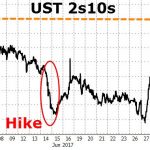It’s Monday, the best day of the week – if you’re not a human being with a job. Here are some nerdy thoughts to ruin your week before it even begins:
1 – Is There Such a Thing as Business “Cycles”? Here’s an interesting post from Tyler Cowen discussing the idea that business cycles might be totally random. I’ve never been a big proponent of the idea of a business “cycle”, you know, the sine wave looking kind of thing where the economy moves in a perfect sequence of peak, contraction, trough, expansion. Instead, I would argue that economy tends to trend and then occasionally veers in an extreme for some reason which causes a boom and then a bust. I imagine it a little bit like a driver who is tired and nods off. He drives straight for the most part, but as he grows increasingly tired he might nod off and veer off the road a bit and in response he overcompensates in the other direction before waking up and then slowly getting tired again. Rinse, wash, repeat.
I don’t know if that’s generally accurate, but I do totally agree with Tren Griffin and Howard Marks who wrote this:
@cullenroche Howard Marks writes in his book “The Most Important Thing”: pic.twitter.com/cM6CdYEzIh
— Tren Griffin (@trengriffin) May 8, 2016
Economists and politicians want to take the volatility out of the economy. But perhaps we need to just remember that the boom and the bust is part of the way human emotions will always play out across time. It doesn’t mean we can’t add guard rails to the roads in case our driver nods off, but it also doesn’t mean we should strap him to the seat with his eye lids stapled to his forehead….
2 – Isn’t All Factor Investing Factor Timing? I was talking to Jake from EconomPic last night on Twitter about factor investing. Jake is very smart and I like him even though he’s a NY Mets fan. He was citing a fantastic new paper by Cliff Asness on factor timing. Basically, Cliff says you shouldn’t try to time factors by using a fund to time the market. For instance, if you believe in the value factor then you don’t try to time when value will beat growth. You just always hold value and assume it will generate its excess return across long enough time periods.














Leave A Comment